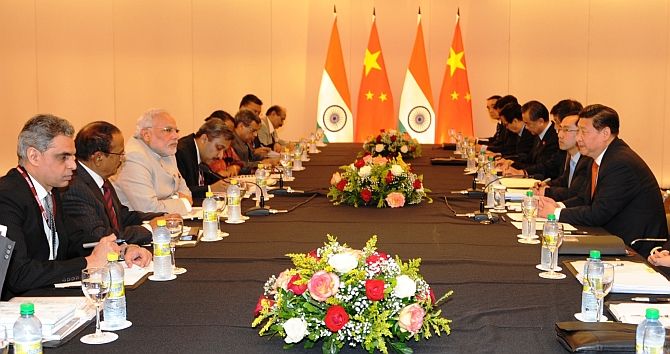 All the three issues raised by China at the Modi-Xi meeting are either intractable or peripheral to the bilateral relations and suggest conventional methods to placate the other side without yielding much, says Srikanth Kondapalli.
All the three issues raised by China at the Modi-Xi meeting are either intractable or peripheral to the bilateral relations and suggest conventional methods to placate the other side without yielding much, says Srikanth Kondapalli.
Prime Minister Narendra Modi termed his meeting with China’s President Xi Jinping at Fortaleza, Brazil, just before the BRICS summit meeting as “very fruitful”, while the foreign minister spokesman suggested, “While the preparation for such a meeting was laid down during the visit of foreign minister and special envoy Wang Yi’s to New Delhi and Vice President Hamid Ansari’s visit to Beijing last month, the fact that both leaders extended the free-wheeling discussion by double the time allotted had attracted international attention.”
Indeed, as President Xi stated, when both countries meet the whole world pays attention to the strategic significance of such ties as two simultaneously rising countries in the world. Xi suggested that his meeting with Modi will be of “significant strategic importance” to bilateral ties.
Xi told Modi, according to Xinhua, that both need to “constantly enhance the China-India strategic and cooperative partnership to a higher level and jointly safeguard our strategic period of opportunities”. This has been the political line that successive Chinese leaderships have taken -- Zhou Enlai in the 1950s, Deng Xiaoping in 1980 -- and reflects the concerns in the Chinese foreign policy that another country with over a billion people and rising economic growth and global power potential should be cultivated on its side.
This is to ensure that India does not become a camp follower of the then superpowers the United States and the Soviet Union. In the current period, China’s leaders are concerned about the strategic impact of United States, India and Japan coming together. Even though Beijing enjoys a “constructive, cooperative partnership” with the United States and clearly a major beneficiary of the largesse of Washington, it wants others not to build relations with the “lone superpower”. This trend is likely to continue as Beijing only last month had invited India and Myanmar leaders to observe Panchsheel principles.
At the Fortaleza meeting, China raised three key issues and reflects to their interest. President Xi suggested on the vexed territorial dispute between the two countries that a “negotiated solution to the border issues at an early date” be made. Secondly, he invited Modi to attend the APEC leaders’ meeting in Beijing slated for November. Thirdly, he suggested India deepen its involvement with the Shanghai Cooperation Organisation.
However, all these three issues are either intractable or peripheral to the bilateral relations and suggest to the conventional methods to placate the other side without yielding much.
For instance, President Xi, after taking over the reins in March 2013, suggested to the Press Trust of India correspondent on March 19 that both should “accommodate each other’s core concerns and properly handle problems and differences existing between the two countries.”
With 33 years of almost uninterrupted talks between the two officials, however, the dispute remains unresolved and incidents like the Depsang Plains in April-May last year when China’s patrols intruded 19 km inside Indian claimed areas test bilateral relations.
Additionally, while the new dispensation in New Delhi has a clear majority in Parliament now with chances of pushing the territorial dispute resolution, the Chinese side on the other hand is hampered by rising nationalism. By terming Arunachal Pradesh as “southern Tibet”, clearly the Chinese leadership had escalated the issue.
Secondly, in the 21-member Asia-Pacific Economic Cooperation, China’s voice has not been decisive since it joined the multilateral institution in 1991. India has sought membership in this initiative but kept waiting. It is led by the United States and other market economies.
The United States itself, as a part of its “rebalance” posture in the Asia-Pacific region, is now planning to push the Trans-Pacific Partnership architecture. In the light of the above, it is queer that the Indian prime minister was invited by China to attend the APEC meeting.
Thirdly, President Xi’s invitation for India to play a bigger role in the SCO should also be taken with a pinch of salt. For here as well India is not a member of the organisation but an observer and whose request to become a full-fledged member since 2004 was kept in abeyance reportedly by Beijing.
Indeed, Modi’s predecessor Manmohan Singh stated that a one billion people representative will not sit in the corridor sipping coffee when the SCO members decide policies. China with 24 per cent financing of the SCO budget (as with Russia but other Central Asian Republics with 10 per cent stakes), suggested at a recent Asthana summit meeting of the SCO that membership drive should be slowed down while “institutionalisation” should be undertaken.
Besides, the membership criterion are so strict -- no aspirant should have territorial disputes, no UN sanctions, etc -- that it is clearly not possible for India to play a bigger role in this organisation.
Nevertheless, the BRICS meeting provided Modi with firsthand experience in working with major events. As he said in his speech at the BRICS summit, Modi was able to “sow… the seeds of personal relationships” with leaders assembled at the meeting, including China’s leader.
Modi identified terrorism, cyber security and climate change as issues of concerns for India. Most of these issues are also raised with China in the recent period -- some with no avail -- but on climate change clearly Beijing benefited from “international isolation” as the former environment minister Jairam Ramesh indicated.
Srikanth Kondapalli is professor in Chinese studies at Jawaharlal Nehru University.











 © 2025
© 2025